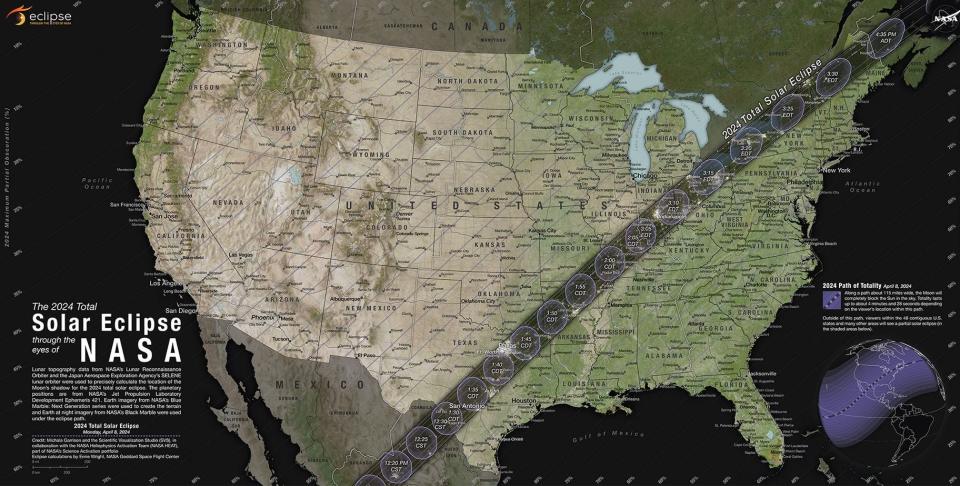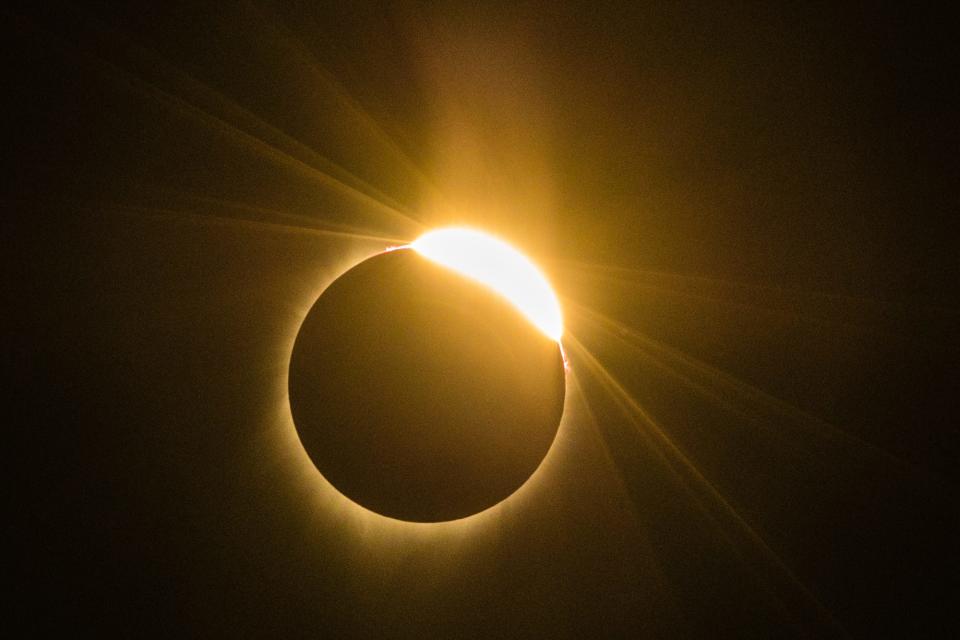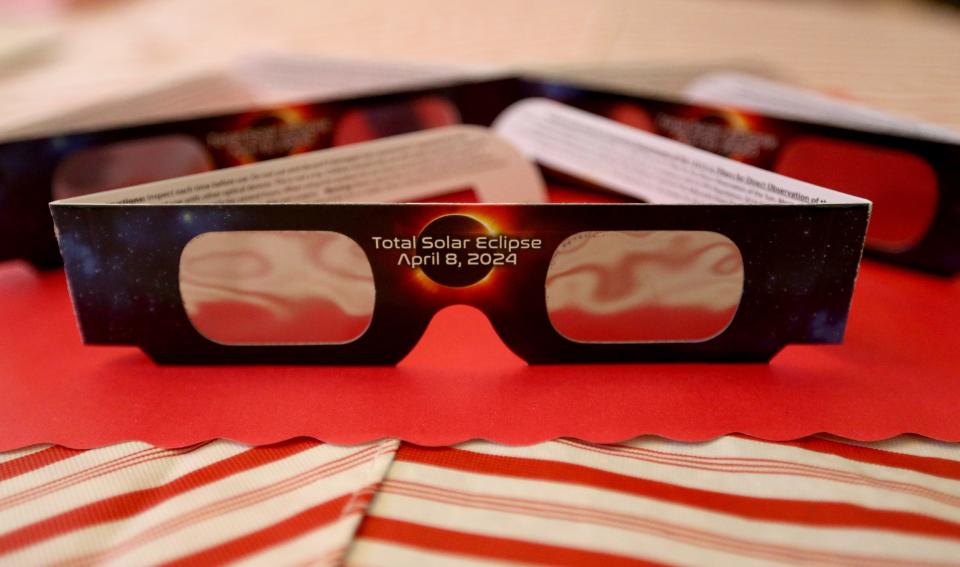How to safely watch the 2024 solar eclipse: Why you can't look without special glasses
A sliver of Michigan will be in the path of totality during the April 8 total solar eclipse, a celestial spectacle that won't occur again in the continental U.S. until 2044.
Whether you plan to look up at the sky in that tiny corner of Monroe County that will have a view of the total solar eclipse starting at 3:13 p.m. or you plan to check out a partial eclipse in other parts of the state, you could do permanent damage to your vision without proper eyewear, said Dr. Nitin Kumar, a senior staff ophthalmologist at Henry Ford Health.
"It's such an amazing event that's happening. It's sort of humbling in terms of putting things in perspective, our place in the world and the universe, and it's natural to want to look at it," Kumar said.

"People say, 'I'm just going to go outside to take a quick peek.' ... People do that, and they look at it without eclipse glasses and then they get instant regret. ... Just do not do it. Don't look at the sun (without eclipse glasses). It's really bad for your eyes."
What if you look at a total solar eclipse without eclipse glasses?
"When you look at the sun directly without any filters, you are basically doing to your retina what you would do to a bug on a sidewalk when you're holding a magnifying glass over them," Kumar said.
The bright light from the sun's rays can burn up the bug when they pass through the lens of the magnifying glass, just as they can burn up the retina in the back of the eye when they pass through the lens in the front of the eye. It's called solar retinopathy.
"You're basically focusing light of extreme intensity directly onto your retina. This causes thermal damage to the cells of the retina that actually do the seeing," Kumar said. "They're the cells that take light, turn it into electricity and send it to the brain. They are called photoreceptors. So looking directly at the sun will literally burn your photoreceptors and cause damage to those cells or make them stop functioning."

He likened the damage that can occur to what happens to the picture on a television when a group of pixels no longer work.
"Those cells stop functioning. ... so you're basically knocking out pixels. If you look at the sun, it will burn out those pixels. Sometimes they regenerate, but for the most part they don't," Kumar said.
Dr. Julie Rosenthal, an ophthalmologist, clinical assistant professor at the University of Michigan and a retina specialist at the Kellogg Eye Center, said a healthy retina is essential for good vision.
More: 2024 solar eclipse glasses: What NASA says is safe, where to buy
"The retinal tissue in the back of the eye is where you have your most clear central vision that you use to read and recognize faces and see things up close," Rosenthal said. "And that is generally where the damage occurs when you look at the sun.
"Sunlight is very strong energy. Welders can sometimes get damage from that very strong light, too. Looking directly at the beam of light from a laser pointer also can cause it."
What are symptoms of solar retinopathy?
"You won't know that you are damaging your eyes until the damage has occurred," Kumar said. "Think about if you accidentally look at the sun or if there's a big bright flash and you see that flash as a spot in your vision even after it's gone. Everybody's had that before briefly. Now imagine that's permanent.
"Basically, that's what it looks like. There's a missing spot where it looks very bright in your center of vision or just off your center of vision. You might not be able to see well enough to read, to watch TV, to do things like that. Your peripheral vision will be fine, it's just your central vision, the vision that occurs in what's called the macula, that is usually affected."
Rosenthal said some people experience other symptoms as well.
"Sometimes people are left with wavy lines in their vision," Rosenthal said. "It'll affect your up-close vision a little bit more if you have the damage right in the center, which is where most people have a problem because they looked directly at the sun."
If you have a toddler or infant who cannot or will not wear eclipse glasses, Rosenthal suggests having them stay inside during the eclipse.
Is there a treatment for solar retinopathy?
"There's no treatment for it," Kumar said. "There's no way that we can replace the photoreceptors once they are lost.
"You are only born with a certain number of retinal cells, and that's it for your whole life. We don't have any way of transplanting retinal cells or the retina. If we did, then we'd be able to cure macular degeneration and other blinding diseases. But we don't have the ability to do that.
More: 2024 solar eclipse: Early April 8 weather forecast predicts clear skies near Michigan
"Any cell that is lost is a cell that's gone. Now, there's a lot of redundancy in the retina. Patients with diseases like macular degeneration can lose a large portion of their retinal photoreceptors and still see OK, but they don't see like they used to. It's the same thing with this."
Rosenthal said in some cases, minor damage can heal over time.
"The vision may get a little better over the first six months or so, but some of the time it doesn't heal completely," she said. "Sometimes, people are left with a blind spot in their vision or wavy lines in their vision where they can't see."
How long does it take to cause serious damage?
Injury can occur after just a few seconds of looking at sun without eye protection, Kumar said.
"You cannot look at the sun directly without a filter" even during a partial eclipse, when its light is mostly covered by the moon, but there's still a rim of sunlight around it, he said.

Damage often occurs during total solar eclipses, when people take off their protective eyewear to see totality, when the sun is completely covered by the moon, Rosenthal said, but fail to put on their glasses quickly enough as the eclipse phases out of totality.
"That's when damage can occur, because people want to see the actual eclipse in totality and don't recognize that the sun is about to show itself again," Rosenthal said.
"It doesn't have to be a long exposure at all to cause damage. It definitely can can happen rather quickly."
What kind of eclipse glasses are safe?
Sunglasses — even those with very dark lenses — welding goggles and homemade filters are not sufficient to protect your eyes during a solar eclipse, according to the American Academy of Ophthalmology.
The only safe way to view the eclipse is to use a special filter, goggles or glasses that meet the global safety standard and are ISO 12312-2 certified. Be sure to check that the glasses you have are not scratched or damaged.
The American Astronomical Society has posted recommendations on where to find safe eclipse glasses and special-purpose solar filters, which are 1,000 times darker than ordinary sunglasses: eclipse.aas.org/eye-safety/eyewear-viewers.
"Things that you have lying around the house, different types of filters, frosted glass, etc., those are not appropriate to look at the sun," Kumar said.

"If you want to look at it with a telescope, there are solar filters that you can use on a telescope to look at it. And then there are different types of projection systems. The most common one is called a pinhole projector and you basically have a little hole where light comes in from the sun and the light is projected onto a bright piece of paper or other material in the background."
Can I take my glasses off when the eclipse is in totality?
Yes, but not for long. If you are in the path of totality and the moon is completely covering the sun, it would then be safe to remove your eclipse glasses to look at it, Kumar said.
"But the problem is totality doesn't last that long. And as soon as you're out of totality, then you're seeing the sunlight coming right back towards you," he said. "It's really unsafe to do it. I would not recommend it."
What should people do if they think they damaged their eyes during the eclipse?
Rosenthal said anyone who suspects damage from looking at the eclipse should see an eye doctor for a fully dilated eye exam.

"Unfortunately, there isn't much that the doctor can do to treat it, but we can monitor it and see if that's really what's causing that problem," she said. "Certainly, other things can cause those symptoms and we'd want to rule those out as well.
"The most important thing is education and knowing not to stare directly at the sun, no matter how tempting it might be."
Contact Kristen Shamus: [email protected]. Subscribe to the Free Press.
This article originally appeared on Detroit Free Press: Can you look at a total solar eclipse? Why you need glasses
